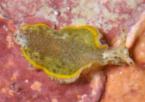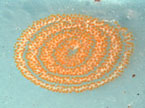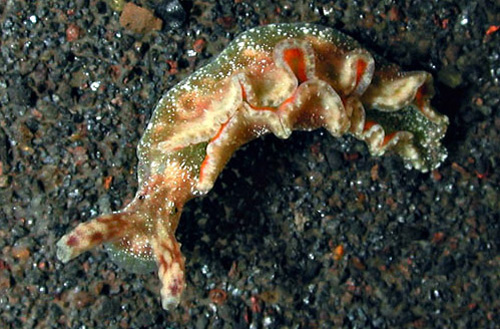_______________
Additional Photos

underside

interior

variation in spots

young, 6 mm

predation

egg mass
_______________
GALLERY

|
Elysia degeneri Ostergaard, 1955

Maximum size: 22 mm.
Identification:
This
is
a mottled species with low parapodia that meet in a
series of irregular folds. It may be distinguished from other cryptic Elysia spp by the orange
submarginal
band on the interior of its parapodia. Some animals have a few maroon
spots on the tips of their rhinophores.
Natural history:
Although
seldom
seen by divers, Elysia
degeneri is a common species found on shallow rocky bottoms. It
occurs in protected to moderately
exposed locations at depths of 1-12 m (3-39 ft) but is most common at
< 2 m (< 6 ft).
Mature animals are diurnally active but remain in the open when resting
at night. They feed on the algae Udotea
(Kay, 1979). Egg masses are bright orange and moderately tightly
coiled. A reticulate pattern of cream extra-capsular yolk is usually,
but not always, present and is closely associated with the eggs.
Hatching occurs in about five days in the laboratory.
Distribution:
Maui, Oahu and Kauai: widely distributed in the western & central
Pacific.
Taxonomic notes:
It
was
first recorded in Hawaii from Waianae, Oahu by Otto Degener on March 26,
1923 and was named for him. (Ostergaard, 1955)
Photo: CP:
9.5 mm: Hekili Point, Maui; June 2, 2003.
Observations and comments:
Note
1: ( )
|
|





